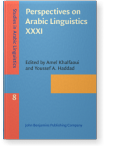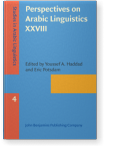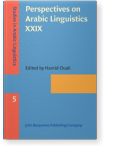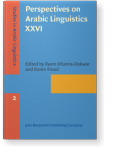Youssef A. Haddad
List of John Benjamins publications for which Youssef A. Haddad plays a role.
Journal
ISSN 2950-1806 | E-ISSN 2950-1792
Titles
Perspectives on Arabic Linguistics XXXI: Papers from the annual symposium on Arabic Linguistics, Norman, Oklahoma, 2017
Edited by Amel Khalfaoui and Youssef A. Haddad
[Studies in Arabic Linguistics, 8] 2019. xiii, 264 pp.
Subjects Afro-Asiatic languages | Theoretical linguistics
Perspectives on Arabic Linguistics XXVIII: Papers from the Annual Symposium on Arabic Linguistics, Gainesville, Florida, 2014
Edited by Youssef A. Haddad and Eric Potsdam
[Studies in Arabic Linguistics, 4] 2016. xii, 248 pp.
Subjects Afro-Asiatic languages | Theoretical linguistics
2019 Speaker-oriented attitude datives as authority indexicals: Evidence from family talk in the Syrian soap opera ba:b l-ħa:ra Perspectives on Arabic Linguistics XXXI: Papers from the annual symposium on Arabic Linguistics, Norman, Oklahoma, 2017, Khalfaoui, Amel and Youssef A. Haddad (eds.), pp. 159–180 | Chapter
Most, if not all, Arabic dialects license the use of optional dative pronouns that index or point to the speaker as an authority figure in relation to the hearer and the activity that the speaker and hearer are involved in. I refer to these pronouns as speaker-oriented attitude datives and analyze… read more
2019 Introduction Perspectives on Arabic Linguistics XXXI: Papers from the annual symposium on Arabic Linguistics, Norman, Oklahoma, 2017, Khalfaoui, Amel and Youssef A. Haddad (eds.), pp. ix–xiv | Chapter
2017 Chapter 8. The Merge Condition on Adjuncts: Evidence from circumstantial clauses in Lebanese Arabic Perspectives on Arabic Linguistics XXIX: Papers from the Annual Symposium on Arabic Linguistics, Milwaukee, Wisconsin, 2015, Ouali, Hamid (ed.), pp. 205–226 | Chapter
Discussion of merge as a feature-driven operation has predominantly focused on the restrictions on Set Merge, or substitution. This paper addresses the topic of Pair Merge, or adjunction. It suggests that Pair Merge is subject to a restriction called the Merge Condition on Adjuncts. While Set Merge… read more
2016 Introduction Perspectives on Arabic Linguistics XXVIII: Papers from the Annual Symposium on Arabic Linguistics, Gainesville, Florida, 2014, Haddad, Youssef A. and Eric Potsdam (eds.), pp. ix–xii | Article
2016 Cyclic Spell-Out Derived Agreement in Arabic Raising Constructions Perspectives on Arabic Linguistics XXVIII: Papers from the Annual Symposium on Arabic Linguistics, Gainesville, Florida, 2014, Haddad, Youssef A. and Eric Potsdam (eds.), pp. 193–226 | Article
Standard Arabic licenses raising structures with three types of verbs known collectively as verbs of appropinquation. Raising structures with these verbs are unique in that they permit different subject positions and an agreement pattern that is not found otherwise in the language. Matching the… read more
2014 Paradoxical paradigms! Evidence from Lebanese Arabic phonology Perspectives on Arabic Linguistics XXVI: Papers from the annual symposium on Arabic Linguistics. New York, 2012, Khamis-Dakwar, Reem and Karen Froud (eds.), pp. 185–210 | Article
Examinations of Optimal Paradigms (McCarthy, 2005) suggest that only phonological outputs of inflectional paradigms obey Optimal Paradigm constraints, whereby each member of a given paradigm strives to resemble the phonological structure of each other member of that paradigm. Words that are derived… read more



